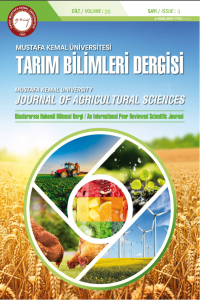Abstract
Aims: In this study, it is aimed to reveal the factors affecting the almond growing decisions of the producers who grow and do not grow almond in Adıyaman, which has become prominent in almond cultivation in recent years.
Methods and Results: The data of the research were obtained through a survey from 175 producers in Kahta and Besni districts of Adıyaman, where almond cultivation is carried out intensively. In the study, the producers' attitudes towards almond growing within the scope of Planned Behavior Theory were examined under the titles of attitudes towards behavior, subjective norms, perceived control beliefs, and economic factors, and it was found that there were statistically significant differences between groups in most of the elements.
Conclusions: It has been revealed that the local farmers generally view almond growing positively in terms of income increase, utilization of their land, providing product variety and self-consumption, and that the trend towards almond cultivation will increase in the future. In addition, the high costs of establishment, the time it takes to reach full efficiency and the need for workforce are stated as important factors in decision making.
Significance and Impact of the Study: High expectations from almond growing make it necessary to carry out training and planning studies by the relevant institutions in order to prevent problems such as rapid increase in supply that may arise in the future.
References
- Anonim (2021)TÜİK Bitkisel Üretim İstatistiklerihttps://biruni.tuik.gov.tr/medas/?kn=92&locale=tr (Erişim tarihi: 21.04.2021).
- Erten S (2002) Planlanmış Davranış Teorisi ile Uygulamalı Öğretim Metodu. Hacettepe Üniversitesi Edebiyat Fakültesi, (19)2: 217-233.
- Meijer SS, Catacutan D, Sileshi GW, Nieuwenhuis M (2015) Tree planting by smallholder farmers in Malawi: Using the theory of planned behaviour to examine the relationship between attitudes and behaviour. Journal of Environmental Psychology 43: 1-12.
- Mercan N (2015) Ajzen`in Planlanmış Davranış Teorisi Bağlamında Whistleblowing (Bilgi İfşası). Sosyal ve Beşeri Bilimler Dergisi, 7(2): 1-14.
- Rutherford LG, Devaney, SA (2009) Utilizing the Theory of Planned Behavior to Understand Convenience Use of Credit Cards. Financial Counceling and Planning, (20)2: 1-16.
- Ukav İ (2019) Economic Evaluation of Almond Farming. The Case of Adiyaman (Turkey). Journal of Economics and Sustainable Development, 10(18): 38-45.
Abstract
Amaç: Bu çalışmada son yıllarda badem yetiştiriciliğinde ön plana çıkan Adıyaman’da badem yetiştiren ve yetiştirmeyen üreticilerin badem yetiştirme kararlarını etkileyen unsurların ortaya koyulması amaçlanmıştır.
Yöntem ve Bulgular: Çalışmanın verileri badem yetiştiriciliğinin yoğun olarak yapıldığı Adıyaman’ın Kahta ve Besni ilçelerinde 175 üreticiden anket yoluyla elde edilmiştir. Çalışmada, üreticilerin Planlı Davranış Teorisi kapsamında badem ağacı yetiştiriciliğine yönelik tutumları; davranışa yönelik tutumlar, kişisel normlar, algılanan davranışsal kontrol ve ekonomik faktörler başlıkları altında incelenmiş ve unsurların birçoğunda gruplar arasında istatistiksel açıdan anlamlı farklılıklar olduğu görülmüştür.
Genel Yorum: Yöre çiftçisinin genel olarak badem yetiştiriciliğine gelir artışı, arazilerini değerlendirme, ürün çeşitliliği sağlama ve öz tüketim yönlerinden olumlu baktıkları ve gelecekte de badem yetiştiriciliğine yönelimin artacağı ortaya çıkmıştır. Bunun yanında kuruluş maliyetlerinin yüksek olması, tam verime ulaşmanın zaman alması ve işgücüne duyulan ihtiyaç karar almada önemli unsurlar olarak belirtilmiştir.
Çalışmanın Önemi ve Etkisi: Badem yetiştiriciliğinden beklentilerin yüksek olması, ileriki dönemlerde ortaya çıkabilecek hızlı arz artışı gibi sorunların önlenmesi açısından ilgili kurumlar tarafından eğitim ve planlama çalışmalarının yapılmasını gerekli kılmaktadır.
References
- Anonim (2021)TÜİK Bitkisel Üretim İstatistiklerihttps://biruni.tuik.gov.tr/medas/?kn=92&locale=tr (Erişim tarihi: 21.04.2021).
- Erten S (2002) Planlanmış Davranış Teorisi ile Uygulamalı Öğretim Metodu. Hacettepe Üniversitesi Edebiyat Fakültesi, (19)2: 217-233.
- Meijer SS, Catacutan D, Sileshi GW, Nieuwenhuis M (2015) Tree planting by smallholder farmers in Malawi: Using the theory of planned behaviour to examine the relationship between attitudes and behaviour. Journal of Environmental Psychology 43: 1-12.
- Mercan N (2015) Ajzen`in Planlanmış Davranış Teorisi Bağlamında Whistleblowing (Bilgi İfşası). Sosyal ve Beşeri Bilimler Dergisi, 7(2): 1-14.
- Rutherford LG, Devaney, SA (2009) Utilizing the Theory of Planned Behavior to Understand Convenience Use of Credit Cards. Financial Counceling and Planning, (20)2: 1-16.
- Ukav İ (2019) Economic Evaluation of Almond Farming. The Case of Adiyaman (Turkey). Journal of Economics and Sustainable Development, 10(18): 38-45.
Details
| Primary Language | Turkish |
|---|---|
| Subjects | Zootechny (Other) |
| Journal Section | Araştırma Makalesi |
| Authors | |
| Publication Date | December 7, 2021 |
| Submission Date | July 13, 2021 |
| Acceptance Date | September 7, 2021 |
| Published in Issue | Year 2021 Volume: 26 Issue: 3 |

